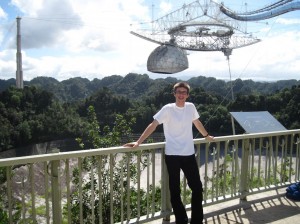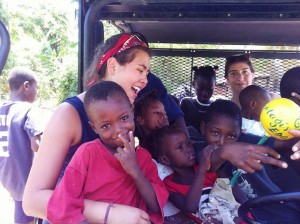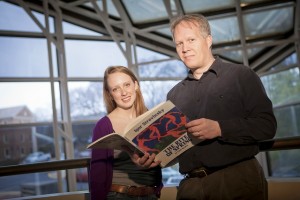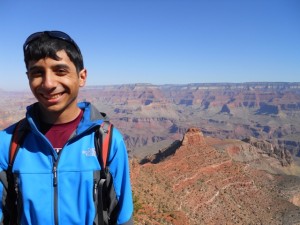Michael Pinkard ’14 (Puyallup, Wash.) is as comfortable with a tenor saxophone in his hand as a telescope. At Lafayette, he has found plenty of opportunity to pursue both his passions: music and the mysteries of the universe. Pinkard is pursuing a dual B.S. in physics and mathematics, and he also performs and plays jazz music whenever he gets a chance.

Michael Pinkard ’14 at Arecibo Observatory in Puerto Rico
Last year, Pinkard attended the undergraduate ALFALFA workshop at the Arecibo Observatory in Puerto Rico, which has an enormous 300-meter-diameter antenna. Since 2005, ALFALFA (Arecibo Legacy Fast ALFA Survey) has been surveying the sky to pick up faint cosmic radio signals from “dark galaxies.”
“It was one of the best experiences of my life,” Pinkard says. “We—the undergrads involved with the ALFALFA project—connected amazingly well. When everyone has a passion for the same topic, a group can form a strong connection in just a short time. We were out exploring Arecibo and stargazing every night, hardly sleeping because we had so much to do together in such a short time.”
Pinkard and Lyle Hoffman, professor of physics, presented research at the meeting of the American Astronomical Society in Austin, Texas. Their work involved an analysis of data from the ALFALFA survey using the Arecibo Radio Telescope and the Sloan Digital Sky Survey, a large online database with optical observations of over 500 million stars and galaxies.
Pinkard is also a Creative and Performing Arts (CaPA) fellow. Last fall, he organized the CaPA Cabaret in which students presented their creative works, ranging from writing to studio art to theater, and Pinkard performed as a member of a jazz quintet.
With his varied talents and interests, it is little wonder that Pinkard is the recipient of a Marquis Scholarship from the College.

Madeleine O’Neill ’13 takes a break from her work in Haiti to play with village children.
Approximately 15 percent of admitted students each year are offered the scholarship, which now provides an annual minimum award of $24,000. Those selected to be Marquis Scholars have demonstrated intellectual curiosity, superior academic achievement, and civic engagement at their high school and hometown community.
Providing clean water in Haiti
At Lafayette, the things that students can accomplish aren’t limited to their majors. Marquis Scholar Madeleine O’Neill ’13 (Katonah, N.Y.) is majoring in English and psychology, but she has also been involved in a project to bring clean water to Haiti in the wake of a devastating earthquake.
O’Neill was part of a small group of students, all from different academic disciplines. They worked with Community Coalition for Haiti to introduce a water filtration system to improve access to clean water for a group of families living in a compound of shacks and cement homes across from their primary water source, the polluted Grand Rivière de Jacmel.
The project was part of the National Academy of Engineering Grand Challenges Scholars Program. Lafayette students are encouraged to get involved by developing innovative solutions to solve complex problems.
“It was a great experience to learn so much about each other’s disciplines and open our minds to different viewpoints,” says O’Neill.

Tracy McFarlan ’13 and Kirk O’Riordan, assistant professor of music, in the Williams Center for the Arts
Music history
Another Marquis Scholar, history major Tracy McFarlan ’13 (Yardley, Pa.), has used her knowledge of history in music research.
She worked with Jorge Torres, associate professor of music, on his book, The Greenwood Encyclopedia of Latin American Popular Music. Through the EXCEL Scholars undergraduate research program, she edited entries in the encyclopedia, managed information about its contributors, and even contributed a few entries herself.
“There’s actually a lot of crossover between history and the arts,” she says. “The underlying historical environment helps to make sense of why artistic movements happened when they did, why styles caught on, what kinds of art appealed to the people. The great part about Lafayette is that it not only recognizes that all fields are inherently interdisciplinary, but emphasizes it as you take classes both within and outside your major.”
McFarlan presented a paper at the College Music Society national conference, a three-day meeting in which performers, composers, musicologists, and music educators share research on a wide range of topics from all musical disciplines. Most speakers are graduate students or faculty; it is very rare that a second-year undergraduate is invited to read a paper, especially one who applied as a first-year student.
The research, “Identity Crisis: Music, Art and Literature from 1900 to 1914,” was derived from her final project in her First-Year Seminar, taught by Kirk O’Riordan, assistant professor of music, who also supervised her preparation for the conference.

Tyler Fruneaux ’14 at the Grand Canyon
Off-campus learning
Tyler Fruneaux ’14 (Southborough, Mass.), a chemical engineering major, has made the most of off-campus learning opportunities.
He studied in Madrid, Spain, in a semester program led by Joshua Smith, assistant professor of mechanical engineering. Fruneaux and the other students stayed in the homes of Madrid locals. Having regular conversations in Spanish led to huge strides in his Spanish-speaking skills.
“I can have a conversation with pretty much anyone,” he says.
Marquis Scholars also receive a scholarship of up to $4,000 for one faculty-led, off-campus course during an interim session in January or May. Fruneaux took the summer course Geology from A (Arches) to Z (Zion): The Geology of National Parks in the Western United States. The group visited the national parks within the geologic region known as the Colorado Plateau stretching across northern Arizona and southern Utah.
“I didn’t really understand what was going on in the classroom, but once we got into the field, I began to recognize certain features, and throughout the course, I really mastered what we had learned,” he says.



